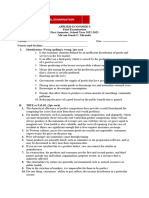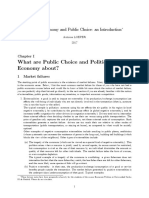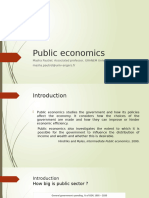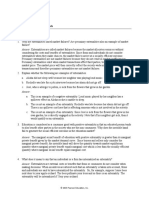Social Implications of Economics
Social Implications of Economics
Uploaded by
Lizzy ErasmusCopyright:
Available Formats
Social Implications of Economics
Social Implications of Economics
Uploaded by
Lizzy ErasmusOriginal Title
Copyright
Available Formats
Share this document
Did you find this document useful?
Is this content inappropriate?
Copyright:
Available Formats
Social Implications of Economics
Social Implications of Economics
Uploaded by
Lizzy ErasmusCopyright:
Available Formats
Social Impact: looking at how things affect people and society as a whole.
- For example, when a new factory opens, it might create jobs (positive social impact), but it
could also cause pollution (negative social impact).
- Economists study these effects to see how they can make things better for everyone.
Market Moral Dilemma: is a situation where doing what's right might not make the most
money.
- Imagine a company that could make more profit by selling a product that's not very safe.
- The moral dilemma is whether to prioritize making money or doing what's ethical and safe.
Market Failure: happens when a market doesn't work perfectly, and it causes problems.
- For example, if a market doesn't consider pollution, companies might pollute a lot because
they don't pay for it.
- So, the market "fails" to account for the harm caused by pollution.
In simple terms, social impact is about how economics affects people and society. A market
moral dilemma is when doing the right thing clashes with making money. Market failure is when
the market doesn't work well and causes issues like pollution or unfairness.
Market Failure
Category Explanation Example
Occurs when one company has too much control A single cable company controlling
1. Monopoly Power over a market, which can lead to higher prices and TV and internet services in an area,
less choice for consumers. leading to high prices.
Happens when the actions of buyers or sellers have
Pollution from factories affecting the
side effects on people who aren't directly involved in
2. Externalities health of nearby residents, without
the transaction, either positive (benefits) or negative
compensation.
(costs).
Involves goods or services that are non-excludable
Street lighting or national defense,
(people can't be easily excluded from using them)
3. Public Goods which benefit everyone and can't be
and non-rivalrous (use by one person doesn't reduce
limited to just a few people.
availability to others).
Occurs when one party in a transaction knows more
4. Asymmetric Used car sellers hiding defects in a
than the other, leading to problems like deception or
Information vehicle from buyers.
poor decision-making.
When resources like air, water, or fisheries are Overfishing in the oceans due to lack
5. Common
available to many but not owned by anyone in of regulations, leading to declining
Resources
particular, they can be overused and depleted. fish stocks.
Happens when markets aren't competitive enough,
6. Imperfect Local pharmacies colluding to keep
leading to limited choices and potentially higher
Competition drug prices artificially high.
prices for consumers.
You might also like
- Property Rights, Externalities and Environmental ProblemsDocument22 pagesProperty Rights, Externalities and Environmental Problemsii mu100% (1)
- L8 Economic Issues and Market FailuresDocument25 pagesL8 Economic Issues and Market Failureskurumitokisaki967No ratings yet
- Applied EconomicsDocument2 pagesApplied EconomicsJanah MirandaNo ratings yet
- Lectures Notes PE CIII Spanish 2022 Capitulos 1-2Document30 pagesLectures Notes PE CIII Spanish 2022 Capitulos 1-2vegaNo ratings yet
- Introduction To Market FailureDocument3 pagesIntroduction To Market FailureJennifer Baquial Comia100% (1)
- Chapter 2 Market FailureDocument57 pagesChapter 2 Market Failurecucba23rdbatchNo ratings yet
- Lahoti Et Al (2016) - The GCIP Datasets - An OverviewDocument6 pagesLahoti Et Al (2016) - The GCIP Datasets - An OverviewdatateamNo ratings yet
- Topic 2 (B) : Market Efficiency & ElasticityDocument8 pagesTopic 2 (B) : Market Efficiency & ElasticityKelvin Chu JYNo ratings yet
- Unit 2 Part 1Document18 pagesUnit 2 Part 1FeelipeferrerNo ratings yet
- Market FailuresDocument36 pagesMarket Failuresyansisay00No ratings yet
- Lectures Notes PE CIII 2020 April 1 AGDocument72 pagesLectures Notes PE CIII 2020 April 1 AGBryan BustamanteNo ratings yet
- Chapter 2 Market FailureDocument57 pagesChapter 2 Market FailureRifat HoqueNo ratings yet
- MDS 529 - Handout 2Document7 pagesMDS 529 - Handout 2faruque.ddsNo ratings yet
- Market Failure GovernmentDocument20 pagesMarket Failure Governmentdiyanav1047No ratings yet
- Public Economics Diapo Cours Section 1 MoodleDocument51 pagesPublic Economics Diapo Cours Section 1 MoodlezahreldinelaliNo ratings yet
- CH 14-Market FailureDocument19 pagesCH 14-Market FailureDivya SinghNo ratings yet
- Ec2 Economics: Command Words Review Chapters 11 - 16 RevisionsDocument33 pagesEc2 Economics: Command Words Review Chapters 11 - 16 Revisionsbardak twoNo ratings yet
- Externality and Market FailureDocument8 pagesExternality and Market FailureMessiah JOHNNo ratings yet
- Microeconomics Canadian 2nd Edition Hubbard Solutions Manual 1Document36 pagesMicroeconomics Canadian 2nd Edition Hubbard Solutions Manual 1robertwattskboqadpznt100% (45)
- Eco 2nd Sem Unit 3Document2 pagesEco 2nd Sem Unit 3Mr BeastNo ratings yet
- Market FailureDocument4 pagesMarket Failuregabriellestewart334No ratings yet
- Market FailureDocument20 pagesMarket FailurePratham GarodiaNo ratings yet
- MGT 610Document7 pagesMGT 610beingixhtiaqNo ratings yet
- Market Faliure: Presenter: Topic: Key MessageDocument8 pagesMarket Faliure: Presenter: Topic: Key MessagedelimaNo ratings yet
- Market Failure: Externalities, Monopoly, Asymmetric Information, and Public GoodsDocument45 pagesMarket Failure: Externalities, Monopoly, Asymmetric Information, and Public Goodssumit sharmaNo ratings yet
- Economics Unit 5 - 1457145468349Document5 pagesEconomics Unit 5 - 1457145468349VaanazhaganNo ratings yet
- Marketing's Impact On Individual Consumers: 1. High PricesDocument4 pagesMarketing's Impact On Individual Consumers: 1. High PricesYoumna El HerraouiNo ratings yet
- July 2011 How Adam Smith or Utilitarian Are Criticized Marks 3Document12 pagesJuly 2011 How Adam Smith or Utilitarian Are Criticized Marks 3irtaza HashmiNo ratings yet
- Adobe Scan 31 Aug 2023Document1 pageAdobe Scan 31 Aug 2023ItsmebroNo ratings yet
- Market Failure - 2Document26 pagesMarket Failure - 2ananya.vasishthaNo ratings yet
- Amare Zewude Natural - Resources - and - Environmental - Economics-2Document4 pagesAmare Zewude Natural - Resources - and - Environmental - Economics-2Simbcha chucah100% (1)
- ME 3th AssignmentDocument7 pagesME 3th AssignmentElga khaoulaNo ratings yet
- Chapter 2 FIN 306 - FinalDocument36 pagesChapter 2 FIN 306 - FinalAbid vhiNo ratings yet
- G9 Chapter 2 - NotesDocument2 pagesG9 Chapter 2 - NotesSeiNo ratings yet
- Economics ReviewerDocument12 pagesEconomics ReviewerAndrea PepitoNo ratings yet
- SUMMARIZEDocument12 pagesSUMMARIZELanie AngodNo ratings yet
- Desy Wahyu Rahmawati Imabs A (20180410104) : Economics AssignmentDocument5 pagesDesy Wahyu Rahmawati Imabs A (20180410104) : Economics AssignmentDesy Wahyu RahmawatiNo ratings yet
- Public Goods and Public UtilityDocument13 pagesPublic Goods and Public Utilitykaiserjadonanto007No ratings yet
- Market Failure - Sources - Module IDocument12 pagesMarket Failure - Sources - Module ISatish DasNo ratings yet
- Economics NotesDocument21 pagesEconomics NotesYen Lee83% (6)
- DPM 2100 Lecture 4Document27 pagesDPM 2100 Lecture 4Shawaz HusainNo ratings yet
- 1.4 Market FailureDocument79 pages1.4 Market FailureVed AsudaniNo ratings yet
- DR Neelam Tandon Chapter 2 UNIT 2 Market Failure 1647093785Document16 pagesDR Neelam Tandon Chapter 2 UNIT 2 Market Failure 1647093785Priya ShuklaNo ratings yet
- ЛЕКЦИИDocument16 pagesЛЕКЦИИvishnay427No ratings yet
- CH 13 - Market Economic SystemDocument12 pagesCH 13 - Market Economic SystemVCrockzNo ratings yet
- Market Failure - WikipediaDocument11 pagesMarket Failure - WikipediaCaryl Anne Macaraig BarquillaNo ratings yet
- Allocative Efficiency, Market Failure and Government Measures To Address Market FailureDocument16 pagesAllocative Efficiency, Market Failure and Government Measures To Address Market Failurekim2hockinsNo ratings yet
- Usman Attari: MGT-610 Final Term Subjective byDocument8 pagesUsman Attari: MGT-610 Final Term Subjective byAhmed NiazNo ratings yet
- Economics Study Guide 2Document4 pagesEconomics Study Guide 2ballsofballs2345No ratings yet
- Document From Hassan RazaDocument12 pagesDocument From Hassan RazaAli Raza100% (1)
- Null 7Document21 pagesNull 7preciouskazvita7No ratings yet
- Industries Class 8 QADocument3 pagesIndustries Class 8 QAtwolivegreensNo ratings yet
- Unit 8 Producers & Consumers: International RelationsDocument2 pagesUnit 8 Producers & Consumers: International RelationsEdu Lamas GallegoNo ratings yet
- Essentials of Economics 7th Edition Gregory Mankiw Solutions ManualDocument15 pagesEssentials of Economics 7th Edition Gregory Mankiw Solutions Manualsexton.garookuh6lsjr100% (29)
- Classification of GoodsDocument3 pagesClassification of GoodsSheldon JosephNo ratings yet
- Notes (11/04/2021) Chapter 14 Market FailureDocument4 pagesNotes (11/04/2021) Chapter 14 Market FailureAnushka100% (1)
- Chapter 6 EconomicsDocument3 pagesChapter 6 EconomicsLorenzo, Patricia AnnNo ratings yet
- Topic 7 Globalization and Emerging Trends - Instructor PresentationDocument31 pagesTopic 7 Globalization and Emerging Trends - Instructor PresentationSakshi SukhnaniNo ratings yet
- Lazada RefundDocument1 pageLazada RefundfidosNo ratings yet
- 15 The Scramble For and Partition of West AfricaDocument38 pages15 The Scramble For and Partition of West Africakdkdkd100% (7)
- Consolidated Students Numeracy Profile SY 2020-2021 Quarter: Pre-TestDocument2 pagesConsolidated Students Numeracy Profile SY 2020-2021 Quarter: Pre-TestRichard NinadaNo ratings yet
- STD Awareness ProgramDocument12 pagesSTD Awareness ProgramKevin DamasoNo ratings yet
- Starbucks Marketing Plan Kinzy - 007 ComsianDocument30 pagesStarbucks Marketing Plan Kinzy - 007 ComsianKinzy_007100% (4)
- A Final Project On "Estimating Deforestation of Gatwala Forest Park District Faisalabad Through Sentinal-2 and Landsat Imagery"Document12 pagesA Final Project On "Estimating Deforestation of Gatwala Forest Park District Faisalabad Through Sentinal-2 and Landsat Imagery"iqra chNo ratings yet
- An Autonomous Organization Under The Deptt. of School Education & Literacy, MHRD Govt. of IndiaDocument6 pagesAn Autonomous Organization Under The Deptt. of School Education & Literacy, MHRD Govt. of IndiaAparna DasNo ratings yet
- DARE MagazineDocument62 pagesDARE MagazineLarissa Ho100% (1)
- Derek (Glover - Managing Professional Development in Education (1996)Document190 pagesDerek (Glover - Managing Professional Development in Education (1996)André FonsecaNo ratings yet
- Relatos Salvajes Will Not WinDocument3 pagesRelatos Salvajes Will Not WinLucía ArtusoNo ratings yet
- Students Book Answer KeyDocument63 pagesStudents Book Answer KeyDuong DuongNo ratings yet
- The Chronicle of Morea Historiography inDocument9 pagesThe Chronicle of Morea Historiography inLupuNo ratings yet
- MoTI Utility Permit ManualDocument183 pagesMoTI Utility Permit ManualfoadiaNo ratings yet
- The Impact of Modular Distance Learning On AcademiDocument7 pagesThe Impact of Modular Distance Learning On AcademiElyn PedrosNo ratings yet
- Key Performance Indicators - KPIsDocument6 pagesKey Performance Indicators - KPIsRamesh Kumar ManickamNo ratings yet
- Joshua Bryant - Tidal Wave Publishing Task TemplateDocument5 pagesJoshua Bryant - Tidal Wave Publishing Task Templateapi-351522367No ratings yet
- Mapping Injeksi Balok SF (19 July 23)Document1 pageMapping Injeksi Balok SF (19 July 23)Dewa PradnyaNo ratings yet
- Islam Ek Khoobsurat MazhabDocument1 pageIslam Ek Khoobsurat MazhabHira ShahzadiNo ratings yet
- Final Test - KPMG - A - 3.19.2018Document3 pagesFinal Test - KPMG - A - 3.19.2018ĐẶNG THỊ THU HÀNo ratings yet
- q2 WK 7 8 GD 9 Summative TestDocument3 pagesq2 WK 7 8 GD 9 Summative TestNimfa Rapsag SeparaNo ratings yet
- FMS - Unit 6 - Insurance PDFDocument6 pagesFMS - Unit 6 - Insurance PDFHarushika MittalNo ratings yet
- MIDTERM AnswersDocument5 pagesMIDTERM AnswersDonayre SevillaNo ratings yet
- Company ProfileDocument15 pagesCompany ProfileAnurag MeshramNo ratings yet
- Workbook Listening ScriptDocument6 pagesWorkbook Listening ScriptGraça ClaraNo ratings yet
- 7370 F (P)Document2 pages7370 F (P)Sourav9230No ratings yet
- Fentanyl TransdermalDocument8 pagesFentanyl TransdermalnurhalimaNo ratings yet
- Build A Mobile Shopping AppDocument90 pagesBuild A Mobile Shopping Apptestcertif1996No ratings yet
- Master CirDocument62 pagesMaster CirAnand YenaNo ratings yet
- Silverio Vs RepublicDocument11 pagesSilverio Vs Republiccodearcher27No ratings yet
- Operation Buster-Jangle, 1951 A123441Document192 pagesOperation Buster-Jangle, 1951 A123441Robert GatesNo ratings yet

























































































